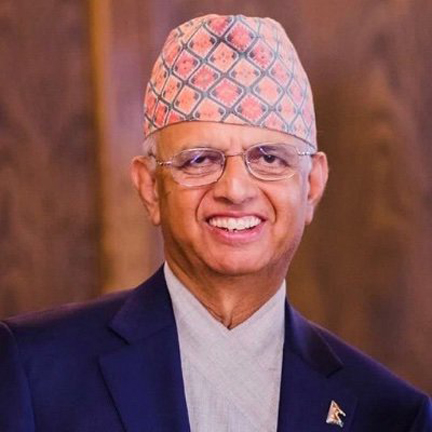Opinion
The foreign secretary should have a diplomatic background
State institutions are being grossly politicised and made pliant and loyal to individual leadership.
Dinesh Bhattarai
A new world is in the making, wherein the focus will be on decisions made in Beijing and New Delhi. At a time when the possible impacts on Nepal have to be analysed closely to safeguard national interests, a systemic attack is occurring in the country on institutions of oversight and restraint—including the media—and on educational institutions, to make them pliant. An amendment to the Federal Civil Service Act currently underway in Parliament has a provision that allows the transfer of secretaries of any background from other ministries to fulfil the role of foreign secretary. This portends disturbing trends for foreign policy.
The first elected government of BP Koirala envisioned a professional foreign service in 1959. That vision was killed with the abrupt dismissal of the parliamentary system of government by king Mahendra in 1960. All efforts to revive the service failed and it just remained as one of the several groups of the Nepal Administrative Service. The Sushil Koirala-led government got the amendment to the Civil Service Act passed by Parliament and created a separate foreign service in 2015. After this singular institutional achievement, instead of taking steps forward to further strengthen the diplomatic service, it is unfortunate that the present government is attempting to take a regressive step to dilute and demolish the foreign service altogether.
If the proposed change goes through, it would cause incalculable damage to the lead institution—the Ministry of Foreign Affairs (MoFA). Developments in the global or regional arena will not pause for Nepal to understand the changes, just because our country’s foreign secretary does not have the necessary technical background. The Foreign Ministry needs to stand ready with necessary researches, analyses, briefings, the right talking points, the appropriate interpretation of messages and actions, and their possible implications on Nepal’s interests.
Better prepared
Nepal has diplomatic relations with 166 countries. The government maintains 30 embassies, three UN permanent missions and six Consulates General. There are over 100 Honorary Consuls. The Ministry of Foreign Affairs as the lead agency conducts diplomacy through these instruments. Diplomats are the nation’s eyes and ears abroad; constantly collecting information, understanding and analysing perspectives of the host countries and the wider international community, and explaining Nepal’s perspectives to them. At a time when Nepal’s greatest need is to build and improve the capacity of institutions in order to convert challenges into opportunities, the government’s abuse of MoFA—making it a crippled institution—is most unfortunate.
Given the increasing engagements of Nepal at the bilateral, regional and international levels, the country’s interests are best served by a professional diplomat—schooled, trained, experienced, and thoroughly well-versed in foreign policy matters. Foreign policy matters have never been so pressing and indispensable in promoting national interests and articulating national positions. At a time when the unfolding circumstances demand the professionalisation of the diplomatic service, the politicisation of the foreign policy establishment for short term gains is risky and dangerous, especially for long-term national interests. In the context of rapidly shifting geopolitics centred on Nepal’s neighbourhood, we must take foreign policy issues seriously and stay better prepared. Nepal must have a sound and strong machinery to promote friendship, cultivate goodwill and garner support—fully aligned with national priorities—to advance national interests.
Nepal’s diplomacy has been the victim of the whims of the political leadership. We are being told hundreds of lies a day. The nation cannot survive on double standards, falsehoods and flattery. The leadership’s self-interests bypassing institutional interests produces nothing but unintended consequences for the country. Moreover, the foreign policy establishment gets very little support from the political leadership. Nepal’s premier foreign policy think tank—the Institute of Foreign Affairs—is starving in resources and analytical talents. The Foreign Ministry has been slow to understand the urgency and gravity of issues and challenges, as was demonstrated by the last minute cancellation of participation in the joint military exercises under BIMSTEC last year.
Outdated thinking
The government has failed to create an environment of trust and confidence in state institutions. Diplomacy cannot be first-rate with broken institutions. MoFA needs to be allowed to move from a reactive mindset to a proactive one. The ‘generalist’ tradition of diplomacy has been found to be increasingly insufficient. It is time to build real expertise and show a deep understanding of underlying trends taking place in the country and beyond, both inside the government and outside, including sector, technology, demography, governance and statecraft. Trends during the Cold War could be attributed to the United States and the Soviet Union. That is no longer the case. Decisions made in New Delhi, Beijing, matter not only for Nepal but to the entire world. The Foreign Ministry needs to have adequate capacity to quickly, closely, critically, carefully and comprehensively understand, analyse and assess the possible impact of happenings in the neighbourhood and around the world.
The country needs to secure trust to win friends. Without effective institutions in place, it is difficult to win the confidence and trust of friends. Diplomacy is the first instrument for emerging and established powers alike to project the country’s image and to apply soft power. The Foreign Ministry is understaffed and underfunded in proportion to the huge responsibilities that are assigned to it. The annual intake of officers should be increased, with a focus on quality and diversity. Recruitment should be a rigorous process to get the best and brightest minds of the country. The practice of considering knowledge as coming ex-officio and ad-hoc must discontinue. Nothing exacerbates Nepal’s challenges more than this approach. We need world-class diplomacy backed by 21st century institutions. World class diplomacy requires world class diplomats.
Nepal is increasingly and explicitly coming under global attention due to its geostrategic location between two rising powers. Geopolitics has become so complex, interlocked and fragile with great powers’ competition focused on Asia. Nepal has no mechanism and capacity to monitor developments and analyse its possible implications for its future. Foreign service has been neglected for a long time, and it continues to be sidelined by the leadership. Nepal is already bearing the consequences of the deliberate neglect of professionalism is state institutions. For a country like Nepal, diplomacy is the first and the last line of security, dignity, and development. The country’s survival depends on effective diplomacy, and on smart, experienced and capable diplomats.
Bhattarai is former foreign affairs advisor to the government.




 12.73°C Kathmandu
12.73°C Kathmandu










